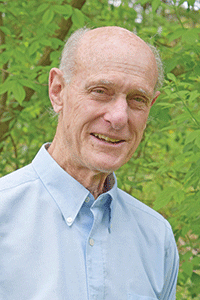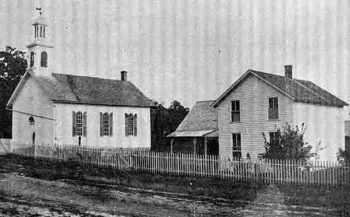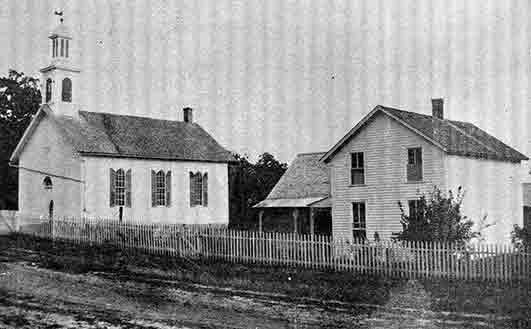
Part one of a series
The youth played table tennis without incident, but basketball was once curtailed because of cursing. It was the 1940s at the South Ridge Evangelical United Brethren Church (E. U. B.). Since 1968, when that denomination merged with the Methodist Church, the Houston County congregation has been known as South Ridge United Methodist Church.
In those early days of settlement, as it remained for generations, churches were not only places for worship and church-related observances, such as Christmas and wedding receptions, but also sites for community activities unrelated to religion, be they picnics, plays or table tennis. This was especially likely for rural churches where there was no community center in an adjacent village or town.
Area historian David Beckman, a third-generation church member, addressed the South Ridge United Methodist congregation in October 2022 at the annual Harvest Home Service with his recollections while growing up on a South Ridge farm a few miles west of La Crescent.
Most early settlers along the boundary between Mound Prairie Township and La Crescent Township were immigrants from Germany. David’s Beckman great grandparents, 54-year-old August and Louisa Beckman (age 57) arrived in Houston County in 1895 from Pomerania, a small Germanic province in northern Europe bordering the Baltic Sea. The family unit included two daughters and nine-year-old son Fred, David’s grandfather-to-be. An 1897 diploma certifies that young Fred attended the Storer Valley School (District 93).

Photo submitted
The immigrant Beckman family worshiped at Immanuel Evangelical Lutheran Church on lower South Ridge. But as a young man, Fred attended one of the campfire revival meetings of the Tabor Evangelical Church. One night in the park, he answered an altar call and “found the Lord,” as the family would say. Fred became a life-long member of the congregation, which in 1922 became the South Ridge Evangelical Church. In 1907, Fred married Augusta Huebner and established a family with eight children plus an orphaned nephew and niece.
Many immigrant groups have to this day retained vestiges of their European heritage, but it could be challenging to have recent German heritage when World War I broke out. In 1918, the South Ridge congregation stopped using the German language for catechism, Sunday school and sermons. One church member, Phillip G. Arnet was memorialized on a plaque as one of “The Boys in Our Church Who Answered Our Country’s Call To Serve in the World War 1917-1918.” United States patriotism was still fervent during World War II when the church continued to hold elaborate Fourth of July celebrations.
David said the church was “quite the love boat, or should I say love ark.” Most of the Fred and Augusta Beckman children (David’s father, aunts and uncles) grew up among the church congregants and eventually found romance and spouses among the faithful. David recalled that his cherished church youth activities also involved his 25 cousins. David’s father Victor met his future wife Anna Marie Heutzenroeder at the church when she, a young schoolmarm at South Ridge School, came to the church as a cast member of a youth play, “The Awakening of Mr. Tightwad.”
One family story involved Hazel Beckman, who after Youth Alliance meetings at the church, would go sit in the Chevy coupe of Herb Boldt and not get out until he had driven her home. It must be noted that Herb never locked the car doors.
David’s own romance did not begin at the church, “but this church is the place where I first realized that all pretty young girls were not cousins.”
The “best addition to the church” was the 1920 construction of Memorial Hall, a large building with two levels and a full-length front porch. “The building did not have an interior stairway nor was it heated and never had running water or a drain.” The ground-level included a kitchen with a wood stove and a large dining room, which hosted bridal showers, wedding receptions and picnics. The upstairs was one large room, which hosted youth meetings, basket socials, Sunday School classes, plays, concerts and summer Vacation Bible School.
“Kenneth Evans turned the hall into a sports area,” recalled David. “He built and installed two basketball backboards and hoops.” However, the minister once forbade young men to play due to their bad language.
According to Lois McElhenny, the hall was never locked, so she and her friends enjoyed many a session of table tennis. David credited that availability for his table tennis prowess during college dormitory competitions.
David will never forget or likely cannot forget, at age eight attending a wedding shower, where the bride when opening a gift, a lovely serving bowl, exclaimed, “It’s a chamber pot!” And when the groom, Lyle Schild pulled away the remaining wrapping paper, a mouse jumped out. The bride “screamed and threw the chamber pot which noisily bounced along the concrete floor. Ladies screamed and men grabbed their pant legs as the terrified mouse scurried among feet and chair legs. Lyle immediately reprimanded his buddies who had frightened his bride-to-be out of her wits and demanded they immediately apologize and catch the mouse. After alluding its captors for some time, the mouse found a safe haven and gift opening resumed.”
Memorial Hall had been built as a separate structure because it was considered a desecration to build a basement room beneath the church. But 32 years later (1952), a basement was finally added under the church. Lyle Schild purchased the upper level of the hall and moved it to La Crescent to be remodeled as their home. Do you suppose one of the mouse’s great, great grandchildren made the move, too.
To be continued (but no more mice)…


Leave a Reply